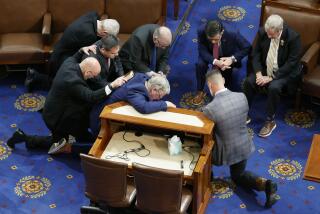Rev. John Bennett; Ethicist, Social Activist
- Share via
The Rev. John C. Bennett, ethicist and former president of Union Theological Seminary in New York whose views helped mold the nation’s conscience for half a century, has died. He was 92.
Bennett died Thursday of respiratory failure in Claremont, where he lived after retiring.
Ordained as a Congregationalist minister, Bennett was a leader in the ecumenical movement and an activist in social causes that eventually became national ones: anti-fascism before World War II, civil rights, women’s rights and opposition to the Vietnam War.
“All this (was) far in advance of the ‘popularity’ of these movements on the part of progressive religionists,” said Holland L. Hendrix, current president of the seminary, where Bennett served as president from 1963 to 1970.
“His real aim was, I think, to be on the cutting edge of critical social movements, but without getting out of touch with political reality,” said E.C. (Pete) Reckard, a neighbor at Pilgrim Place in Claremont. The retirement community is home to many Protestant educators and ministers.
In 1981, Bennett identified for The Times 17 unethical positions that he said had been held historically by church leaders but later abandoned or spoken of defensively.
“Most, if not all of them,” he said, “reflect a humanizing of Christian ethics and we may wonder that Christian ethics had been stuck in so many inhumane positions.”
He listed those “inhumane” moral stances in an address to members of the American Academy of Religion. Among them were slavery, anti-Judaism, white supremacy, male superiority and capital punishment.
Unable to write or lecture in his final years, Bennett still received a stream of visitors wanting to discuss social ethics.
With Reinhold Niebuhr, Bennett had co-founded the magazine Christianity and Crisis, and he came to represent the “liberal” side of Niebuhr’s teachings on Protestant realism.
Niebuhr departed from earlier idealists with the notion that Christians must take into account the realities of earthly--political--power when deciding how to think and act.
Before World War II, Bennett spoke out against isolationism in the face of Nazi aggression. Although he later became an opponent of American involvement in Vietnam, he was not a pacifist.
“Most of his generation, which had been through the ‘30s and (World War II), could not be pacifists,” Reckard said.
Cobb said Bennett in recent years was “deeply troubled” by extremist talk and actions.
“Not in the sense that it destroyed his serenity,” Cobb said. “But the deterioration of public discourse in this country was certainly a source of pain for him. That and the weakening of the mainstream denominations, which may be related to it.”
Bennett influenced and was influenced by his wife, Ann, a feminist and peace advocate who died in 1986.
Born in Kingston, Canada, Bennett earned a bachelor’s degree at Williams College, a master’s degree at Oxford University and theological degrees at Union. He began teaching at Auburn Theological Seminary in 1930, and in 1936 joined the Pacific School of Religion. He returned to Union as a professor in 1943, and was awarded 22 honorary doctorates over the years.
His books include “Christian Ethics and Social Policy” (1946), “Christians and the State” (1948) and “Foreign Policy in Christian Perspective” (1966).
Bennett is survived by a daughter, Elizabeth Hemmer of Sacramento, and sons John, of Claremont, and William, of Portland, Me.
A memorial service in Claremont will be conducted May 21. Union will schedule a service in New York.
More to Read
Sign up for Essential California
The most important California stories and recommendations in your inbox every morning.
You may occasionally receive promotional content from the Los Angeles Times.













